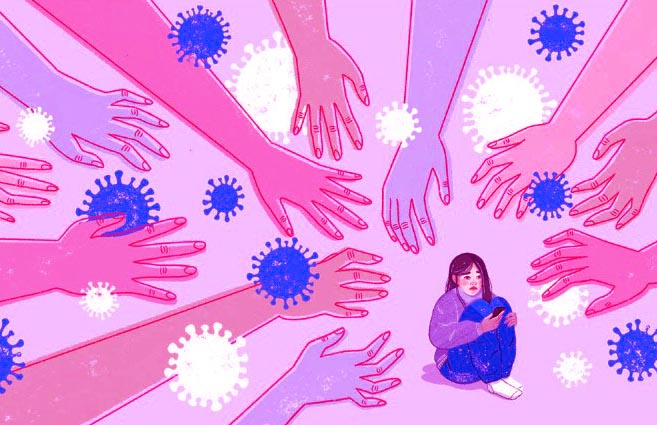Nikhil Prasad Fact checked by:Thailand Medical News Team Sep 03, 2024 1 year, 5 months, 3 weeks, 2 days, 16 hours, 37 minutes ago
Medical News: As the world grapples with the lingering impacts of the COVID-19 pandemic, new research sheds light on the role of chronic stress in increasing susceptibility to SARS-CoV-2 infection, particularly among older adults. A study conducted by a team of researchers from Rutgers University, Pfizer Inc., and the State University of New York at Oswego, among others, has found that elevated hair cortisol levels - a biomarker for chronic stress - may significantly heighten the risk of contracting COVID-19, especially for individuals over 41 years of age. This
Medical News report delves into the findings of this intriguing study, highlighting the potential implications for public health and the importance of stress management in preventing infection.
 Chronic stress may heighten risk of SARS-CoV-2 infection among older adults
Key Findings: Stress and Susceptibility to SARS-CoV-2
Chronic stress may heighten risk of SARS-CoV-2 infection among older adults
Key Findings: Stress and Susceptibility to SARS-CoV-2
The study focused on healthcare workers and non-healthcare staff from a university community in the northeastern United States. Researchers collected hair samples from participants and measured cortisol levels, which were used as an indicator of chronic stress. The participants were then divided into two groups: those who had tested positive for SARS-CoV-2 and those who had not. The results revealed that while there was no significant difference in cortisol levels between the two groups overall, a notable association emerged when the data was stratified by age.
Among participants over 41 years old, higher cortisol levels were linked to a significantly increased likelihood of testing positive for SARS-CoV-2. In this age group, a one-unit increase in hair cortisol concentration was associated with an 84% increase in the odds of infection. This finding suggests that chronic stress, as indicated by elevated cortisol levels, may impair the immune system's ability to fend off infections like COVID-19, particularly in older adults.
Why Age Matters: The Impact of Cortisol on Immunity
The relationship between age, stress, and immune function is complex. Cortisol, a hormone released in response to stress, plays a crucial role in modulating the immune system. Under normal circumstances, cortisol helps to control inflammation and maintain immune balance. However, chronic stress can lead to persistently high cortisol levels, which may have the opposite effect, weakening the immune response and increasing vulnerability to infections.
As people age, their bodies' ability to regulate cortisol diminishes, and the immune system becomes less effective at responding to pathogens. The study highlights how the combination of aging and chronic stress can create a perfect storm, making older adults more susceptible to illnesses like COVID-19. The study's findings underscore the importance of stress management, especially for older individuals, as part of a comprehensive approach to preventing infection.
Healthcare Workers: A Unique Population at Risk
The study also examined healthcare workers, who have been under immense stress throughout the pand
emic due to long working hours, exposure to critically ill patients, and the constant risk of infection. Interestingly, the study found no significant difference in hair cortisol levels between healthcare workers and non-healthcare workers, nor did it find that healthcare workers were at a higher risk of contracting SARS-CoV-2 based solely on their occupation.
However, the researchers noted that support staff and underrepresented minority groups within the healthcare workforce appeared to be at greater risk. This could be due to a combination of factors, including less access to personal protective equipment (PPE), more frequent community-based exposures, and heightened stress levels. These findings suggest that while healthcare workers, in general, may not have elevated cortisol levels compared to non-healthcare workers, certain subgroups within this population may be more vulnerable due to additional stressors and exposures.
Racial Disparities in Cortisol Levels and Infection Risk
Another intriguing aspect of the study was the observation of racial disparities in cortisol levels. Black participants were found to have the highest cortisol concentrations among all racial groups, and this was associated with an increased risk of SARS-CoV-2 infection. Although the sample size for Black participants was small, these findings align with previous research showing that chronic stress related to racial discrimination can lead to dysregulation of the hypothalamic-pituitary-adrenal (HPA) axis, resulting in higher cortisol levels and increased vulnerability to disease.
The researchers emphasize the need for further research to explore the relationship between racial stressors, cortisol levels, and susceptibility to infections like COVID-19. Addressing these disparities is crucial for developing targeted public health interventions that can help mitigate the impact of chronic stress on vulnerable populations.
Conclusions: The Role of Stress Management in Pandemic Response
The findings of this study point to the significant role that chronic stress plays in influencing susceptibility to SARS-CoV-2 infection, particularly among older adults. As the pandemic continues to affect lives globally, the importance of stress management cannot be overstated. Public health strategies should not only focus on physical measures like vaccination and hygiene but also consider the psychological well-being of individuals, especially those at higher risk due to age or other factors.
In conclusion, reducing chronic stress through various means - such as promoting mental health support, encouraging physical activity, and fostering social connections - could be a valuable addition to the arsenal of tools used to combat COVID-19. This approach could help strengthen the immune system, reduce cortisol levels, and ultimately decrease the likelihood of infection.
The study findings were published in the peer-reviewed International Journal of Environmental Research and Public Health.
https://www.mdpi.com/1660-4601/21/9/1166
For the latest COVID-19 News, keep on logging to Thailand
Medical News.
Read Also:
https://www.thailandmedical.news/news/scientist-from-finland-discover-that-wood-surfaces-can-curb-covid-19-transmission
https://www.thailandmedical.news/news/case-study-shows-that-covid-19-can-trigger-type-1-cryoglobulinemia
